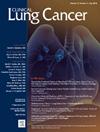Current Trial Report: A Multicenter Phase I/Ib study of Capmatinib Plus Trametinib in Patients With Metastatic Nonsmall Cell Lung Center Harboring MET Exon 14 Skipping Mutations and Other MET-Alterations
IF 3.3
3区 医学
Q2 ONCOLOGY
引用次数: 0
Abstract
Introduction
MET tyrosine kinase inhibitor (TKI) therapy is associated with improved outcomes in patients with nonsmall cell lung cancer (NSCLC) harboring a MET alteration, including MET exon 14 (METex14) skipping mutation, MET amplification, or MET fusion. However, primary or acquired resistance to TKI therapy ultimately develops. In preclinical models, hyperactivation of MAPK signaling was shown to promote resistance to MET TKI; resistance was overcome by co-treatment with a MET inhibitor and a MEK inhibitor. This phase I/Ib study offers a potential combination strategy simultaneously targeting MET (with capmatinib) and MEK signaling (with trametinib) to overcome resistance to MET inhibitor monotherapy in METex14 NSCLC.
Methods
In the dose escalation phase, a minimum of 6 and maximum of 18 patients will be enrolled using a conventional 3+3 design with the primary endpoint of identifying a recommended phase 2 dose (RP2D) of capmatinib in combination with trametinib. Once the RP2D is identified, patients will continue to enroll in a dose expansion phase to a total of 15 patients. The primary endpoint of the dose expansion phase is to further characterize the safety profile of the combination.
Conclusion
This phase I/Ib clinical trial will assess the safety and efficacy of combination capmatinib and trametinib in NSCLC patients whose tumors harbor METex14 skipping mutations, MET amplification, or MET fusion and had developed progressive disease on single agent MET inhibitor therapy.
当前试验报告:卡马替尼加曲美替尼治疗携带 MET 第 14 外显子跳越突变和其他 MET 畸变的转移性非小细胞肺中心患者的多中心 I/Ib 期研究
导言MET酪氨酸激酶抑制剂(TKI)疗法可改善携带MET改变(包括MET外显子14(METex14)跳过突变、MET扩增或MET融合)的非小细胞肺癌(NSCLC)患者的预后。然而,TKI 疗法最终会产生原发性或获得性耐药性。在临床前模型中,MAPK 信号的过度激活被证明可促进对 MET TKI 的耐药性;通过联合使用 MET 抑制剂和 MEK 抑制剂可克服耐药性。这项I/Ib期研究提供了一种潜在的联合策略,同时靶向MET(使用卡马替尼)和MEK信号转导(使用曲美替尼),以克服MET抑制剂单药治疗METex14 NSCLC的耐药性。方法在剂量递增阶段,将采用传统的3+3设计入组至少6例、最多18例患者,主要终点是确定卡马替尼与曲美替尼联合治疗的2期推荐剂量(RP2D)。一旦确定了RP2D,患者将继续进入剂量扩展阶段,总共招募15名患者。结论这项I/Ib期临床试验将评估卡马替尼和曲美替尼联合治疗NSCLC患者的安全性和有效性,这些患者的肿瘤存在METex14跳跃突变、MET扩增或MET融合,并在接受单药MET抑制剂治疗后出现疾病进展。
本文章由计算机程序翻译,如有差异,请以英文原文为准。
求助全文
约1分钟内获得全文
求助全文
来源期刊

Clinical lung cancer
医学-肿瘤学
CiteScore
7.00
自引率
2.80%
发文量
159
审稿时长
24 days
期刊介绍:
Clinical Lung Cancer is a peer-reviewed bimonthly journal that publishes original articles describing various aspects of clinical and translational research of lung cancer. Clinical Lung Cancer is devoted to articles on detection, diagnosis, prevention, and treatment of lung cancer. The main emphasis is on recent scientific developments in all areas related to lung cancer. Specific areas of interest include clinical research and mechanistic approaches; drug sensitivity and resistance; gene and antisense therapy; pathology, markers, and prognostic indicators; chemoprevention strategies; multimodality therapy; and integration of various approaches.
 求助内容:
求助内容: 应助结果提醒方式:
应助结果提醒方式:


